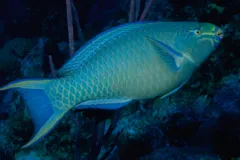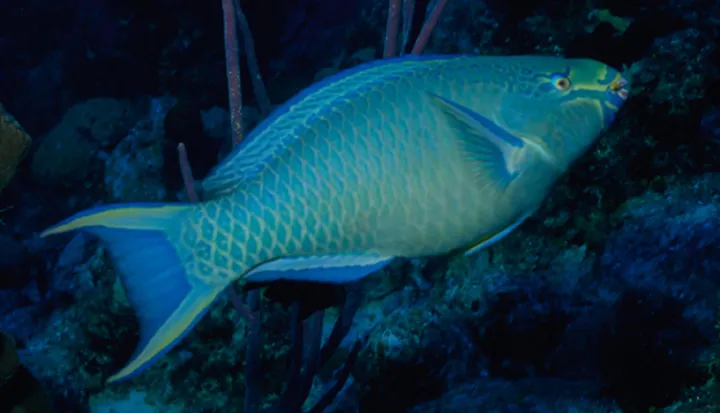From Despair to Repair: Protecting Parrotfish Can Help Bring Back Caribbean Coral Reefs

Reef biologists over a certain age are haunted by memories of what glorious places Caribbean reefs once were. In our youth we studied them for all sorts of reasons but scarcely thought about reef conservation. We took the reefs for granted.
Today, however, we know that most Caribbean coral reefs will disappear in 20 years if we don't restore the grazing fish that defend the corals from seaweed. This message comes through loud and clear in a new report, "Status and Trends of Caribbean Coral Reefs: 1970-2012," which was released today as the result of a three year joint effort of the Global Coral Reef Monitoring Network (GCRMN), the International Union for the Conservation of Nature (IUCN), and the United Nations Environmental Programme (UNEP).
In 1972, marine biologist Sylvia Earle wrote that Caribbean coral reefs are "almost devoid of conspicuous plants." Today the opposite is true: reefs are dominated by conspicuous seaweeds overgrowing, smothering, and poisoning Caribbean corals. The new report shows that living corals throughout the Caribbean have declined by more than 50 percent over the past half century. Given that Caribbean coral reefs are a major oceanic ecosystem that generate more than $3 billion annually from tourism and fisheries, this is a tragedy that must be reversed.
Many people say that climate change has already doomed coral reefs. But the report shows that the loss of parrotfishes and other seaweed-eating grazers has been far more important than climate change for Caribbean reef destruction so far. While it is true that climate change poses an enormous risk for the future because of coral bleaching and more acidic oceans, the fact is that reefs protected from overfishing, excessive coastal development and pollution are more resilient to these stresses. Even if we could somehow make climate change disappear tomorrow, these reefs would continue their decline. We must immediately address the grazing problem for the reefs to stand any chance of surviving future climatic shifts.
We already know that protecting parrotfish and other herbivores from fishing can, in turn, protect healthy reefs. The stunning Flower Garden Banks in the northern Gulf of Mexico are protected by their United States National Marine Sanctuary status, which prohibits the use of fish traps and parrotfish fishing. Bermuda has an even longer history of banning fish traps and spearfishing. And Bonaire, with an entirely tourist-based economy that is reliant on the health of their reefs, has long restricted fishing. A brief breakdown in these protections resulted in an immediate decline in the health of Bonaire’s reefs, which triggered a quick reinstatement of protections.
But reefs where parrotfish are unprotected have suffered tragic declines. These “Failure Reefs” are places where a variety of local human impacts have been allowed to run unchecked: not just by overfishing but also by overuse for recreation, excessive and destructive coastal development, and pollution. The worst of these include Jamaica, the entire Florida Reef Tract from Miami to Key West, and the U.S. Virgin Islands.
We can fix this problem of conserving Caribbean coral reefs. But our fixation on the threat of climate change has caused us to neglect local issues for which we already have solutions. Parrotfish are being destroyed despite their enormous economic and ecological value to the very survival of coral reefs, and the goods and services provided by healthy reefs. The report strongly advocates banning all fish traps throughout the Caribbean, banning spearfishing (a practice that cannot be regulated at the level of fish species), and banning all other fisheries practices that harm parrotfish.
Some countries are already taking new positive action. Barbuda is moving to ban all catches of parrotfish and grazing sea urchins while also planning to set aside one third of their coastal waters as marine reserves.
Saving Caribbean coral reefs is a major challenge, but to quote the legendary Jamaican reggae star Jimmy Cliff, "You can get it if you really want, but you must try, try and try. You'll succeed at last."


